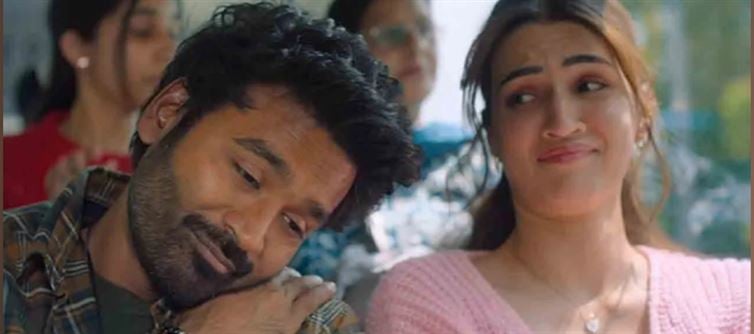
Tere Ishk Mein movie Review – An intense, chaotic, fiery love saga powered by Dhanush’s wildness and Kriti’s quiet storm
Story: love, Rage, Redemption — and a Man Who Burns for All Three
Tere Ishk Mein follows shankar Gurukkal (Dhanush), a volatile DUSU president whose reputation for violence precedes him. Mukti Behniwal (Kriti Sanon), calm yet stubborn, is working on a thesis claiming violent men can be transformed. Shankar’s explosive interruption during her presentation becomes the perfect case study — and the beginning of a dangerous emotional spiral.
Mukti tries to reform him. shankar tries to earn her. love blossoms… and then implodes.
Seven years later, fate throws them back into each other’s orbit — but the past hasn’t finished taking revenge.
It’s a story of obsession, heartbreak, ego, and the lengths to which a wounded man will go when love refuses to love him back.
Performances: The Film Belongs to dhanush & Kriti — Period
Dhanush – A Volcano Ready to Burst
He’s raw, unpredictable, fragile, frightening — and completely magnetic. shankar feels like dhanush in peak form, switching between brutality and brokenness with stunning ease.
Kriti Sanon – Her Most Nuanced Performance Yet
Mukti isn’t easy to play — layered, morally grey, emotionally guarded. Kriti nails it. She never gets overshadowed, even beside Dhanush’s intensity, which is an achievement in itself.
Prakash Raj – Steals the Second Half
His emotional gravitas and warmth inject much-needed weight when the writing falters.
Supporting Cast
Tota Roy Chowdhury surprises in an unorthodox role.
Priyanshu Painyuli is reliable as Shankar’s confidant.
Vineet Kumar Singh shines in a brief but punch-packed appearance.
Ashish Verma is criminally underused.
Mohd Zeeshan Ayyub adds charm and recall value.
Technical Aspects: A.R. rahman Elevates, Editing Deflates
Music & Background Score
Rahman’s score is the film’s heartbeat.
“Jigar Thanda” (both versions) hits beautifully.
“Chinnaware” is an audacious, standout tamil surprise.
“Ladki Jaisi” and “Awaara Angaara” land emotionally.
Oddly, the much-loved title track isn’t fully used — a missed opportunity.
Cinematography
Tushar Kanti Ray captures the grit, chaos, and mountain serenity fairly well — though not memorably.
Production Design
Grounded, textured, believable. Costumes perfectly define class, culture, and character.
Action & VFX
Action is realistic and avoids excessive flair.
VFX, however, fumbles in multiple key scenes.
Editing
This is the big problem area. The film is overlong, uneven, and drags when it should stab.
Direction: Aanand L Rai Swings High… Then Slips Hard
Aanand L Rai grabs you from the first frame. The film’s opening sequence and early flashback structure are absorbing, creating immediate curiosity around the breakup. Several scenes explode with originality — Mukti using shankar as her “subject,” the bar chaos, the intermission cliffhanger, and the emotionally rich father–son moments.
But the second half?
That’s where the film unravels. Convenience replaces craft, logic takes a beating, and the finale stretches far beyond its emotional payoff.
The intent is heavy. The execution isn’t always.
Analysis: A Fiery First Half, a Fumbling Second
The film is built on strong emotion — obsession, pain, longing — and the first half delivers it with punchy writing and standout direction. The chemistry between shankar and Mukti fuels the narrative.
But once the second half begins, logic dissolves. What should have been sharp becomes conveniently written, stretched, and occasionally implausible. The emotional intensity remains, but the storytelling loses its grip.
It’s a film with a beating heart, but shaky bones.
What Works
• Dhanush’s powerhouse, feral performance
• Kriti Sanon’s finest dramatic role
• Several brilliantly staged sequences
• A.R. Rahman’s soulful, raging soundtrack
• Father–son emotional threads
• Strong first half with tight, dramatic beats
What Doesn’t
• Overlong, uneven second half
• Convenience-driven writing
• Logical leaps that weaken the impact
• Underwhelming VFX
• Unnecessary narrative detours
• A climax that tries too hard but hits too soft
Rating: ⭐⭐⭐ 3/5
India Herald Percentage Meter: 68%
Story: 65%
Performances: 90%
Music & BGM: 85%
Direction: 70%
Editing: 50%
Overall Impact: 68%




 click and follow Indiaherald WhatsApp channel
click and follow Indiaherald WhatsApp channel